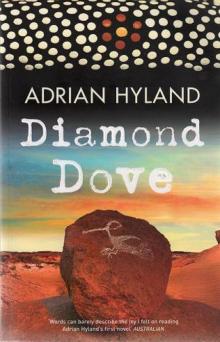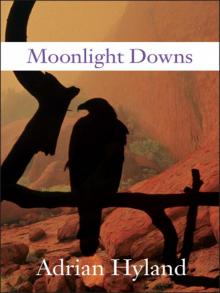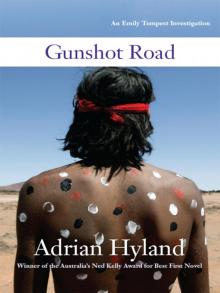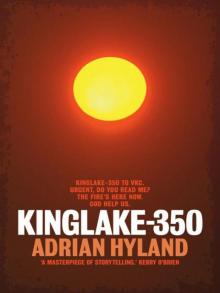- Home
- Adrian Hyland
Diamond Dove Page 2
Diamond Dove Read online
Page 2
An hour later we pulled up for a break, my under- and over-aged passengers in need of a pit-stop. I stretched back, took a long, soothing drag of Champion ruby, surveyed the scene around me through a haze of smoke. The old ladies were digging for yams and some of the younger ones were using a rake to drag a bush banana vine down from a bloodwood. The turkey on the back of my ute had been joined by a kangaroo, a couple of scrawny cats and a bucket of conkerberries.
It was their home country, all right. But was it mine?
I grew up on Moonlight Downs. Came here when I was four years old. My mother, Alice Limmen, was a Wantiya woman, from the Gulf country five hundred k's to the north-east. Of her I remember almost nothing except a thin, sweet face, a Wantiya lullaby and the enveloping breasts upon which I used to nuzzle myself to sleep. My father, Jack Tempest, was a wandering white- feller who courted, married and buried her in the space of five years.
After Jack and I came to Moonlight I ran wild, energetically evading his half-hearted attempts to enrol me in the radio-based School of the Air. The blackfeller camp was school enough for me: I'd be down there at dawn and I wouldn't make it home till dusk. In the intervening hours my little mob and I would hunt in the hills, fish in the creeks, climb the skeletal trees, scour the countryside on horses borrowed from the stock camp.
Occasionally, when I returned from some such expedition dirty and dishevelled, wild honey dripping down my chin, lizards wriggling in a pocket, I'd catch my father glancing at me with a troubled look on his face. Presumably wondering what sort of a wild thing he'd created. But he did, at least, seem reassured by the ease with which I learnt to read, both the books on our shelves and the rocks through which he and I fossicked whenever we had the opportunity.
Jack was a part-time prospector back then, a gouger, and he reckoned I had a good eye. During quiet times on the station he'd take Hazel and me out bush for weeks at a time. The three of us would go rambling across country in his old Bedford truck, looking for traces of gold or working some little claim in the hills.
This wild, magical world came crashing down around my head the year I turned fourteen. Tim Buchanan, the station owner, died without an heir, and the property was taken over by a hard-nosed bastard by the name of Brick Sivvier. The Warlpuju, whose language makes no distinction between p and b, called him prick, which wasn't that far off the mark.
Within a month of his arrival Sivvier had turfed everybody, black and white, off the place and brought in his own people, from Queensland. For me, this meant being shipped off to boarding school in Adelaide. For my father it meant transforming what had been a part-time interest - gold mining - into the full-time occupation that would eventually make his small fortune. For the Warlpuju it meant leaving their homeland for the ten-year exile in boozy, brutal Bluebush.
Still, I reflected as I relaxed at the wheel of my ute, knees on the dash, fag hanging off my mouth, they can't be doing too badly if they can enjoy themselves this much.
Bindi's clutch had packed it in, as a result of which he couldn't change out of first gear. Nor could he stop, since he wouldn't be able to start again so he circled slowly around us like a great clanking buzzard, cracking jokes and occasionally flushing the old boys out of the bushes.
'Aaaiiyy!' yelled Bindi. 'This drivin round in circle tangle up my brain…'
My passengers gave up their various diversions and clambered back aboard. We inscribed a slow circle in the dust and headed for home, swapping insults, oranges, tobacco and, occasionally, passengers, as the kids took whatever opportunity arose to make death-defying leaps between the two cars.
We were running along the foot of Jimpili Hill, almost back at the camp, when something - a shift in the noise level, a subtle tension in the air - made me look up.
There was a row of rocks on top of the hill, or what I took to be a row of rocks until one of them moved. The figure rose to its feet and bellowed,'Kantiya/' - stop there! - in a voice as deep and dark as a valley full of thunder.
My heart sank as he drew closer and I recognised him: he was a tall, powerful man encased in rags, fur and army surplus, a tuft of owl feathers in his headband, a rifle across his shoulders, a pack of ratty dogs at heel.
Blakie Japanangka.
A Reading from the Book of Blakie
Blakie strode down the slope, all windmilling arms and blowabout rags, red dust boiling behind and a fleet of flies scudding above. Around his neck was a quartz crystal on a hairstring necklace. His daks were held up with a length of fencing wire, his chest jangled with a bandolier full of filthy knives. A bloody snake's head wobbled out of a coat pocket. In his left hand he held a huge fighting stick.
'Oh no!' I groaned to Lincoln. I'd forgotten about Blakie. 'Hasn't anyone put him out of our misery yet?'
Lincoln clicked his tongue, sighed fleetingly. A sign of disapproval perhaps, though whether of Blakie's arrival or my lack of respect for an elder was unclear.
Growing up on Moonlight we were forever being threatened and regaled with tales of the demons who lurked in the bush at night, monsters with snakes in their hair and crystals in their eyes, fabulous creatures who'd rip your head off if they caught you dreaming in the wrong direction.
These stories were presumably no more than standard Warlpuju fear-mongering, but I thought they'd all come to life at once on that distant winter night when Blakie first wandered into camp.
I remember lying in the swag with Hazel, terrified, as he stomped from fire to fire and sent a withering blast of invective at the bewildered Warlpuju.
'Fuckin sea comin,' he growled, 'flood water risin, green sea roar, wash away white man, wash away blackfeller white as a ghost inside…'
Blakie's physical presence was bad enough, but infinitely worse were the whispers that followed him.
Blakie was a sorcerer.
Sorcerers out here can cure you or kill you, depending on the mood, and Blakie's mood tended to swing towards the murderous end of the scale.
He was occasionally called upon to save the sick from whatever was possessing them, and they did tend to make speedy recoveries, though my father contended that that was more from fear of their doctor than anything else.
But when the doctor had it in for you, that was it. You might as well give up the ghost, say your good-byes, start the sorry business. He could rip the bones out of your body with a single glance, send his manti - his spirit familiar - into your skull and suck the eyes out of their sockets, seduce your woman from the other side of a claypan, turn himself into a whirlwind and hurl you into the clouds.
Blakie's origins were a mystery. Some of the old people said they'd seen him as a boy, chained to a tree out at Kilyubatu, in the desert north of here. The Kilyubatu mob swore that he'd been raised by dingoes. Teddy Bushgate had it on good authority that he'd been thrown, fully formed, out of a volcano. Us kids, except for Hazel, who was strangely immune from the universal terror and seemed almost fascinated by him, called him Mamu: the Demon.
My old man told me once that, as far as he could piece together the story, some missionary mob had taken the young Blakie to an orphanage in Adelaide, from where he'd absconded into the desert. He emerged years later, blistered, burning and mad as a car-load of camp cooks.
When the Moonlight mob were hunted off the place he stayed behind, of course: if Adelaide couldn't contain him, Bluebush sure as hell couldn't. And when they came back he was still there, roaming across the country, as wild as the whirlwinds that rattled the camp from time to time.
One of which whirlwinds, it appeared, was about to be unleashed.
Bindi pulled over. I had little choice but to do the same.
'Why are we stopping?' I groaned.
'Oh, more better we let him give us an earful now,' Lincoln replied. He'd always been pretty casual about Blakie. Lincoln had been in Darwin working on the wharves when it was destroyed by Cyclone Tracey, and Jack reckoned he'd been pretty casual about that too. 'Otherwise he might get really wild.'
If B
lakie wasn't really wild already, I didn't want to be there when he was: he stormed up to the convoy, caterwauling and cat- walking, letting fly with a volley of spittle and spite which didn't diminish even when he got to Lincoln. If anything, it intensified: he halted, roared, dragged the poor old bugger out of his seat and hoisted him into the air. There must have been twenty people there, but such was the awe in which Blakie was held that they just sat and gaped like a load of slaughterhouse cows.
He had a fist pulled back, apparently about to belt Lincoln, when he suddenly stopped, distracted by something.
Me.
He stared at me with those ferocious eyes, and I wanted to shrivel up and disappear. He forgot about Lincoln, dropped him with a thud and moved in close to me. Very close: I could feel his parasites hopping over to check me out. His hair was as black and greasy as a morning-after frypan. There were desiccated grasshopper legs on his lips and dead blowies in his beard. His face was a mess of scabs and scars, his nose looked like the sort of thing you'd scrape off your bull-bar. I got a close look at the inside of his mouth: it was a concerto grosso of cold sores, hot breath and black teeth.
'Mechanic daughter?' he grunted, his curiosity evidently piqued. 'Em'ly Tempest?'
If I'd been thrilled when Lincoln remembered me, I felt horrified that Blakie did.
'Just passin through, Blakie,' I assured him. 'Just passin through.'
He gave me a look which made it abundantly clear that if he had anything to do with it I'd keep on passing.
'You bin city?' he asked.
'Been to the city,' I answered, nodding politely.
'Which?'
'Adelaide. And Melbourne,' I added, remembering that he was said to have unpleasant recollections of the City of Churches.
Lincoln, meanwhile, had climbed to his feet, and put a hand on Blakie's shoulder to draw him away from me. Blakie glared at him, yelled something I couldn't understand. The two men flew into a fiery debate - or rather Blakie did, while Lincoln tagged along behind, looking in turn puzzled, sceptical and finally concerned.
My Warlpuju was almost as rusty as Bindi's rifle, and whenever elders were talking business the language became arcane, but from what I could follow Blakie was issuing some kind of threat. Or was it a warning? With Blakie there wasn't much difference: it's easy to be a prophet of doom when, should the prophesied doom fail to occur, you're crazy enough to make it happen yourself.
Blakie stood there snarling and growling, his great brow buckled, his beard fierce, his nostrils winged, his eyeballs snaking sideways. Something had been stolen. Or speared. But what? Wartuju juntaka. A fire bird? And someone was going to pay for it. I had no idea who, but Lincoln certainly wasn't his usual easygoing self.
The argument ended when Blakie suddenly wheeled about and gazed up into the hills from whence he'd come. We followed him with our eyes. Somewhere in the distance I heard a jet plane passing with a high thunder that sounded like an echo of Blakie's tormented mind.
'See-im that?' he growled.
See what? I thought. A plane? Big deal.
He stood for a moment, a wild, solitary figure with a corrugated forehead and a cavernous mouth, hearing what sounds or symbols I couldn't imagine.
Then he strode off in the direction of the camp.
'He's going to be our guest for the night?' I asked nervously.
' Yuwayi. Bit of a wild bugger, innit? Still one of our mob, but.'
Weird bloody mob. 'What was that all about, anyway?'
But Lincoln wasn't listening. He stared after the receding maniac, an uncharacteristically troubled look on his face, then turned his gaze up into the ranges.
'Lincoln?' I repeated. 'What was Blakie on about back there?'
'Mmmm? Oh that? Nothin. Just dreamin. Business.'
But he didn't look as though it was nothing, and some of the heaviest shit I'd ever seen - guys cauterised inside because a rock was moved, somebody speared because somebody else had killed the wrong animal - was 'just dreamin'.
The Dreaming - the Jukurrpa - is everything to the Warlpuju: a map, a mythology, a memory bank, a song cycle, but also a code of conduct, out of which you step at your peril.
'Which dreaming, Lincoln?'
'Mmmm?' He looked like I'd just woken him up, like he suddenly remembered he had a guest. He smiled the old compassionate-Buddha smile, patted my shoulder. 'Oh, not your worry, h'Em'ly. You got enough on your plate, comin home after all these years. Me I might head up north tomorrow, take a look round, see what ol Blakie's on about.'
'You want some company?'
'Eh? No, not this time. More safer you stay ere.'
'Safer?'
'Maybe.'
I was curious, but didn't press him. Regrettably, in the light of subsequent events.
He came to me in a dream that night, Blakie. Or a nightmare, a nightmare in which a big, black man, heavily bearded and caterpillar-eyebrowed, was hunting me over an open plain. I was running for my life, summoning up every ounce of energy my body possessed, but it was no use: my legs were growing heavier, my feet were sinking deeper into the drifting sand. When I collapsed, as I'd known I would, he loomed over me, staring, his eyes burning.
Then he crouched down, thrust a knife-like hand into my right side, ripped out a chunk of dripping flesh. He gazed at it malevolently.
A kidney.
I sprang up in horror and clutched the sides of my swag, grimacing. My heart was spitting sparks. Shit, I thought, I hate dreams! Been hating them for years. A kidney. Christ! What was that supposed to mean? Kidneys have got all sorts of magical implications out here: they're the key to the soul, the powerhouse.
I'd parked my swag out on the edges of the single women's camp. Typical, I thought: out on the edges, uncertain of where I fitted in. The handful of old ladies near me were snoring heartily or murmuring in their dreams. I checked the stars: they'd barely shifted. I'd probably only been asleep for an hour or so. Blakie hadn't wasted any time cutting into my nightmares.
People were still moving round the camp. Starlight glowed off the iron roofs. The windmill creaked. A dog barked, another answered, then the whole bloody lot joined in.
Blakie had camped with us for the night. I could see his fire up on Saddlebag Ridge, blinking and flickering and staring down at the camp like an epileptic eye. Looking at it, I felt vulnerable, lonely. A million miles from home.
I put the blanket round my shoulders, went and sat by Lincoln's fire. Stirred the ashes, brewed a billy. Still shaking. After a while Lincoln came out and joined me. He poured the sugar, then poured the tea and handed me a pannikin with a gentle, reassuring hand.
'You worryin for somethin, Nangali?'
'Just a dream, Lincoln. Just a bad dream.'
'Mmmm,' he nodded, running a ruminative hand through his whiskers. 'Bad dreams. You ave em often?'
'Often enough.'
He thought for a while, studied the stars, fiddled with the fire. Then he counselled me, 'Just wait a while, Em'ly. Don't worry. Don't rush. Just listen, look around. It'll happen. You been away too long. Take a little time for the country to remember you.'
I turned my head to look at him. He smiled, patted my knee.
Take a little time for the country to remember you?
You beautiful man, I thought. And curling up at his feet I drifted off into another dream, the antidote, this one. A vignette from one of the sweeter interludes in my life.
I dreamed about Hazel. I was nervous about meeting her, almost afraid, ashamed of the grief I'd given her. But this wasn't the first time she'd enriched my sleep. I dreamed of the time we climbed the tabernacle tree at sunset and sat in its branches, singing along with a choir of birds. And I remembered how, somewhere in that lilting chorus, just for a moment, I'd imagined I was one of them.
Somewhere in the distance a cock crowed. Or a crow cocked. It was hard to tell the difference. Whatever it was it sounded crook.
I opened my eyes and spotted a rooster sitting on a nearby fencepo
st. I'd seen better-looking specimens on Redfern rotisseries: it was evil-eyed, balding, with dagger-like spurs and a fierce beak, presumably the secret to survival in this dog-infested world. The sun was still out of sight, but a golden windmill radiated up through the eastern sky.
Dreams, I thought to myself. Bloody dreams. I could be bounded in a walnut shell and count myself a king of infinite space were it not that I have bad dreams. Even when they're as sweet as the one I'd just experienced, they're still a painful counterpoint to the reality into which we must awake.
I stretched out in the swag. Dew lay across the canvas, beaded the grass. The cold night gave promise of a clear day. I rolled over and looked into the fire, vaguely surprised that it was still burning. Somebody must have stoked it.
A movement on the other side of the fire caught my eye. A baby, sucking on a smooth red stone and staring at me with eyes like search lights. And, through the haze of the fire, a woman, poking at the ashes with a stick.
It took a second or two to sink in.
The woman was Hazel.
Rough Music
I lay still for a moment, a battery of emotions pounding my brain. Given the circumstances of our last encounter, it was only my father's assurance that Hazel wasn't here that had given me the confidence to come back at all.
'Am I still dreaming?' I croaked.
'Ah sistergirl, if you are I am too.'
Sistergirl? If only it were that simple.
'Do you hate me, Hazel?'
'Don't hate nobody, Em.'
'I never came back.'
She frowned, shrugged. 'I coped.' The rough music hadn't gone from her voice. Her eyes were still as lively as a stream of tea being poured from a billy at sundown.
Everything else seemed to have changed, though. Hazel had been the wispiest kid on the station, but the passing years had moulded her into one of the rugged matriarchs upon whom the community was built. She was tall, strongly built, languid in her movements, brooding in her looks. She had a smooth, round face, thick hair and a trace of China in her eyes, a vestige of the days when the Chinese and the blackfellers had sought solace in each other's company at the bottom of the shitheap.

 Diamond Dove
Diamond Dove Moonlight Downs
Moonlight Downs Gunshot Road
Gunshot Road Kinglake-350
Kinglake-350